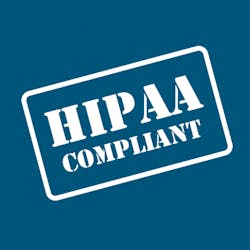Thursday Troubleshooter: Dental patient names on radiographs and HIPAA violations
QUESTION: Is it a HIPPA violation to have a patient’s entire name printed out on the radiograph? If I print a radiograph it will show only the patient’s first name and first initial of the last name. We have always received radiographs labeled with the date and the patient’s entire first and last name. Can someone explain this to me or help me find the information in the HIPPA compliance manual?
Does the minimum necessary rule require the covered entities (CE) to use a partial name? Probably not. HIPAA only requires the CE to make a “reasonable effort” to achieve the “intended purpose.” See § 164.502(b) at http://www.gpo.gov/fdsys/pkg/CFR-2014-title45-vol1/xml/CFR-2014-title45-vol1-part164.xml#seqnum164.502.
The purpose of using the entire name is to make sure the radiograph is correctly identified. It could be unreasonable to use an anonymous code because this could impose a heavy burden on clerical staff. Eliminating part of the name is probably not helpful. The risk of misidentification depends on other factors relevant to the facility. Where are the radiographs located? Are they concerned about workforce members snooping? Is the facility located in a small community? Do they have celebrity patients?
If a patient has special privacy concerns, that person could request confidential communications. See § 164.522(b) at http://www.gpo.gov/fdsys/pkg/CFR-2014-title45-vol1/xml/CFR-2014-title45-vol1-part164.xml#seqnum164.522.
ANSWER FROM LINDA HARVEY, RDH, MS, LHRM, Compliance/Risk Management Specialist:
First is patient safety. Any patient information that is mislabeled or not labeled can lead to a medical error, such as wrong care rendered or care being rendered to the wrong patient. From this perspective, labeling is essential.
Second, as you mentioned, is HIPAA. The HIPAA guidelines state that covered entities (CE) may use protected health information (PHI) for treatment, payment, and operations. CE's and their workforce have obligations to maintain patient information confidentially and security. Your HIPAA manual should address the confidentiality and security of patient data in your practice. It may not address all the unique processes in a dental office, such as how to label radiographs, unless your practice has created a specific policy for this.
It sounds like what you are doing in fine (first name and first initial of the last name), as long as you aren’t using such labeled X-rays for demonstration purposes to other patients. For example, it would not be appropriate to demonstrate a case to another patient considering the same treatment, e.g., implant, if the X-ray was labeled. Use of educational videos and pamphlets helps avoid any confidentiality issues.
RECENT THURSDAY TROUBLESHOOTERS:
How can dental assistant ask for a raise?
Rampant staff cell phone use, including dentist, concerns staff member
Hygienist worried about poor performing staff members
Do YOU have a tough issue in your dental office that you would like addressed?
Send your questions for the experts to answer. Responses will come from various consultants associated with Speaking Consulting Network, Academy of Dental Management Consultants, or Dental Consultant Connection. Their members will take turns fielding your questions on DentistryIQ, because they are very familiar with addressing the tough issues. Hey, it's their job.
Send your questions to [email protected]. All inquiries will be answered anonymously every Thursday here on DIQ.






